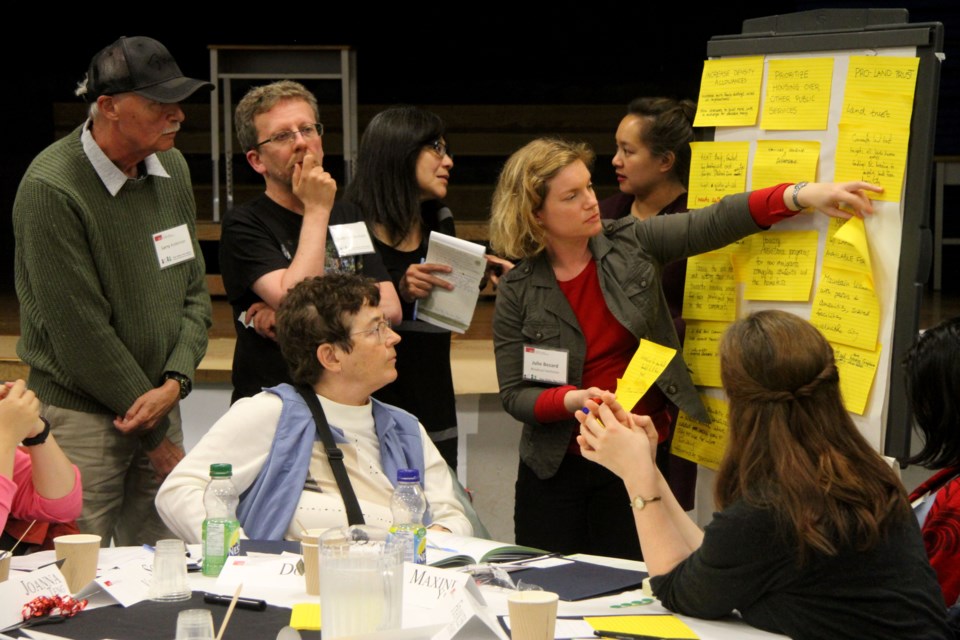The City of Burnaby should allow four- to six-storey apartment buildings in single-family residential neighbourhoods.Â
That’s what 70 per cent of respondents told the city’s housing task force at a recent workshop (44 per cent strongly agreed, while 26 per cent agreed with the idea).
The Community Recommendations Workshop brought 97 people – 74 randomly selected residents and 23 representatives of community organizations – for a day-long session meant to find solutions to the city’s housing crisis. Â
Participants were separated into 14 tables, where they deliberated and later presented their top-three recommendations to improve housing affordability and accessibility.Â
So-called “gentle density” was popular.
“Thirteen of the 14 tables presented recommendations which supported densification in order to increase and diversify existing housing supply,” states a workshop summary report.
Some participants wanted to see Burnaby allow . Under the direction of council, city staff are already studying how the city might pursue those types of housing.Â
Gently densifying single-family neighbourhoods would be a significant change of course for a city that has concentrated new development in its town centres, according to Burnaby's assistant director of long-range planning, Lee-Ann Garnett.
“There seems to be this consensus that, yeah, our single family neighbourhoods are going to change,” Garnett said. “This is really interesting – that there's this big desire for change in neighbourhoods outside of town centres.”
Workshop participants did not, however, call for an end to the flurry of condo tower development in town centres (Metrotown, Edmonds, Lougheed and Brentwood). Sixty-seven per cent agreed the high-density towers should continue to be built.Â
Respondents to a workshop exit survey also said they want Burnaby to create more affordable housing, such as social, low-income, subsidized and non-market developments.
“Participants emphasized the importance of focusing on the most vulnerable residents first (homeless, at risk of homelessness, low income, etc.),” according to the report.Â
Participants seemed to agree the city should do more than provide infrastructure and amenities and leave the creation of affordable housing to higher levels of government. Only 14 per cent of survey respondents felt the city should stick to a more traditional municipal role.Â
The vast majority of workshop participants also called on Burnaby to pursue more partnerships with non-profits, private companies and higher levels of government.Â
They also asked the city to take a holistic approach to planning by ensuring residents have the recreational, transit and health services they need.
“Participants felt that in order to develop more inclusive, healthy and connected communities, it is important to not consider housing in isolation, but rather as part of a broader ecosystem alongside other social environmental and recreational characteristics,” the report states.Â
Another key theme arising from the workshop participants’ recommendations was a desire for more protections and supports for renters. Some tables called for the city to use rental-only zoning and require the inclusion of rental units in new developments – proposals council hasÂ
Three in four participants agreed the city should restrict short-term rentals such as AirBnB, while 78 per cent agreed the city should prioritize cracking down on empty homes and speculation.
The recommendations from the workshop will inform the Mayor’s Task Force on Community Housing’s final report, expected later this month.Â
The workshop was facilitated by Simon Fraser University's Morris J. Wosk Centre for Dialogue, which has partnered with Burnaby for the task force process.Â
Wosk’s manager of engagement and social enterprise, Michelle Bested, said the workshop brought an informed, deliberative approach to public engagement, which is sometimes lacking in municipal decision-making.Â
Participants were required to read background information and spent a day working though ideas with each other, she said, calling it “a tricky process because you can imagine everyone has very different ideas.”
But by working together they were able to agree on some priorities.
“I think they were more informed ideas because they had gone through the process with us,” Bested said.Â
The participants were also a representative sample of Burnaby, mirroring the city’s demographics from cultural, gender, socio-economic, age and housing tenure perspectives.



